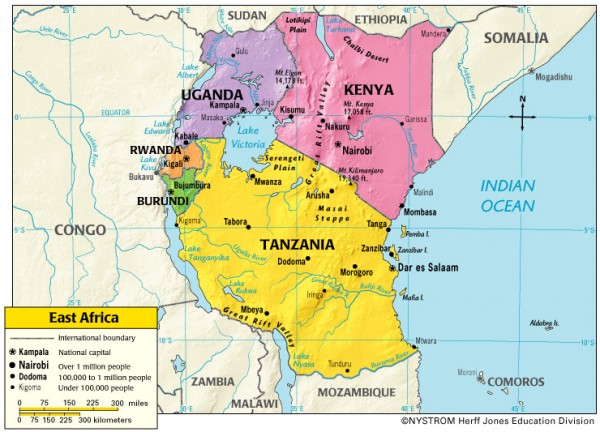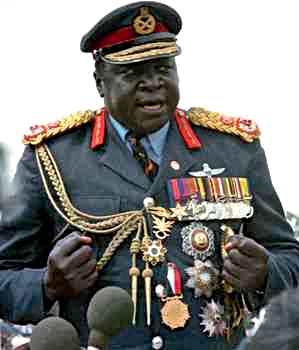Note: This book was WINNER of the Svenska Dagbladet Literature Prize and WINNER of the Aftonbladet Literature Prize in Sweden.
“There is an idea that every phenomenon has its own angel: that there is an angel of war, one for law, one for love. The angel of history, according to historical philosopher Walter Benjamin, is a man who stares at something outside the picture…one single catastrophe which keeps piling wreckage upon wreckage and hurls it in front of his feet.…[ Now] a storm is blowing from Paradise, and has got caught in his wings with such violence that the angel can no longer close them. This storm propels him into the future to which his back is turned – the storm is progress.”
 Telling the story of his father’s life, author Johannes Anyuru, the son of a Ugandan father and Swedish mother, focuses on the fraught political climates of several East African countries in the 1970s, when his father, then in his early twenties, was trying to find some sort of direction and sense of purpose. As a young teen in Uganda in the early 1960s, his father, known here as P, took advantage of a program in Greece which taught him and other young men in Uganda how to fly military aircraft, a program which changed his life. He loves the freedom of the air and sees himself flying professionally. P is an ethnic Langi, belonging to the ethnic group of which President Obote of Uganda is also a member, but as the novel opens, Obote has just been deposed in a coup led by Idi Amin. Assumed to be a supporter of Obote, P has no interest in being drafted into the air corps aiding Amin in his bloody rise to power. Secretly escaping his program in Greece by going to Rome, he then flies to Lusaka in Zambia, hoping to start a job he found as a crop-duster. Tensions are so high in Zambia, however, that he is arrested after being interviewed at the airport, his pilot training in Greece seemingly too sophisticated for a simple crop-dusting job. His interrogators want to know who he is really working for. Deported to Tanzania, which is being attacked regularly by Idi Amin’s men, who are shooting grenades across the Ugandan border into Tanzania, P is regarded as an enemy in Tanzania – a pilot who could help their enemy, Uganda.
Telling the story of his father’s life, author Johannes Anyuru, the son of a Ugandan father and Swedish mother, focuses on the fraught political climates of several East African countries in the 1970s, when his father, then in his early twenties, was trying to find some sort of direction and sense of purpose. As a young teen in Uganda in the early 1960s, his father, known here as P, took advantage of a program in Greece which taught him and other young men in Uganda how to fly military aircraft, a program which changed his life. He loves the freedom of the air and sees himself flying professionally. P is an ethnic Langi, belonging to the ethnic group of which President Obote of Uganda is also a member, but as the novel opens, Obote has just been deposed in a coup led by Idi Amin. Assumed to be a supporter of Obote, P has no interest in being drafted into the air corps aiding Amin in his bloody rise to power. Secretly escaping his program in Greece by going to Rome, he then flies to Lusaka in Zambia, hoping to start a job he found as a crop-duster. Tensions are so high in Zambia, however, that he is arrested after being interviewed at the airport, his pilot training in Greece seemingly too sophisticated for a simple crop-dusting job. His interrogators want to know who he is really working for. Deported to Tanzania, which is being attacked regularly by Idi Amin’s men, who are shooting grenades across the Ugandan border into Tanzania, P is regarded as an enemy in Tanzania – a pilot who could help their enemy, Uganda.
In a narrative best described as circular, P’s story unfolds, moving back and forth in time and place as P, seen through the eyes of his author son, is regarded as an outlaw in Uganda, Zambia, and Tanzania, where he is eventually tortured and half-starved in an effort to get him to confess to crimes connected to the Tanzanians’ belief that he is working for Amin’s air force. Months pass as the imprisoned P becomes increasingly desperate to escape from Tanzania, this time to nearby Kenya, figuring that death in an escape attempt could not be worse than death from prison and torture. Kenya, however, is also in turmoil, as Jomo Kenyatta’s rule has been one of corruption in which his family acquired much land for their own use while the poor remained landless. Eventually, P manages to get to Kenya on foot, and in time, he meets and marries a woman there from Sweden who wants to settle down. A job offer materializes in Tanzania, which has been so cruel with its torture of P in the past, but P actually considers this job a better alternative than a return to Uganda would be. Fearing arrest once again, he and his wife eventually leave Africa completely and go to Sweden to settle down and raise a family.
With a narrative which requires some effort on the part of the reader to put the various episodes into chronological order, Anyuru draws more attention to the individual details of P’s changing life than would occur with a faster moving narrative. The reader feels for P and, to some degree, becomes part of his life as his series of disasters unfolds and develops. In the opening chapter, in which he is being interrogated in Dar-es-Salaam following his expulsion from the airport in Zambia, for example, the complexity of life for an ordinary citizen becomes obvious. President Obote, former president of Uganda, belongs to the same ethnic group as P, but Obote was attacked by “his own” people in P’s Ugandan village when he came to speak in 1969. Though P was already in Greece when this attack on Obote took place, his Tanzanian interrogators still accuse him of being an Amin supporter. He tells the interrogators that his “life was destroyed by [Uganda’s] military coup,” but he has great difficulty remembering “what he has said and what he hasn’t said, which lies, which omissions, and which confessions measure out the bounds of this conversation.” He lies so regularly, in fact, that he even denies that a photograph of himself in a pilot’s uniform is himself, saying that it is one of his classmates. Because of the lies and their suspicions, Tanzanian security sees him as a risk to Tanzanian security and decides to keep him in custody.
Flashing back and flashing forward, the narrative reveals P’s difficult childhood, in which he was under the care of his sadistic older brother. In a flash forward, years later, when the author, P’s son, is in Sweden, investigating P’s life and reading some of his father’s memoirs, he becomes aware that his father served for six months in the Ugandan military before he ever went to Greece, something he has never mentioned. “There’s a strange weight in all those concrete details, a weight that has to do with death…[and] I see with new eyes the images of outcast-ness, scattered-ness, blowing leaves, petals filling the sky.” The son, trying to understand himself and his place in the country of Sweden, also reads history and in a parallel narrative fills in some blanks from his father’s life. We soon learn that while in the prison camp in Tanzania, P has told a fellow inmate a secret he had not told his interrogators, that he had additional dealings with Amin’s men during the summer and is now burdened with feelings of guilt and doubts. He knows he cannot return to Uganda, but he cannot spend more time “sitting in a limousine and talking to the Ugandan military officers and cabinet members because he spent every moment in their company wondering if they had murdered his family, his friends.”
The back and forth narratives of P and his son continue as they try to figure out who they are and where they come from, and require the reader to fill in blanks by making their own connections. For P, the biggest issue is escaping to someplace safe. For his son, it is filling in the blanks in his own life by learning more about who is father is, or has been. P remains full of mysteries, largely because one never knows whether he is telling the whole truth about the things we do know about him. As he is dying, P, in Sweden, connects with additional family there and becomes closer to his son. Ultimately, the novel comes full circle, the final lines paralleling the lines which open this review, with one big difference in meaning: “A storm blew in from paradise. The storm was life.”
Photos. The map of East Africa is from https://www.africa-ontherise.com
The author’s photo appears on https://sverigesradio.se/
The photo of Idi Amin may be found on https://tvtropes.org/
The Cessna T-37, the plane that P learned to fly at the Greek Military School, is shown on https://www.pinterest.com




